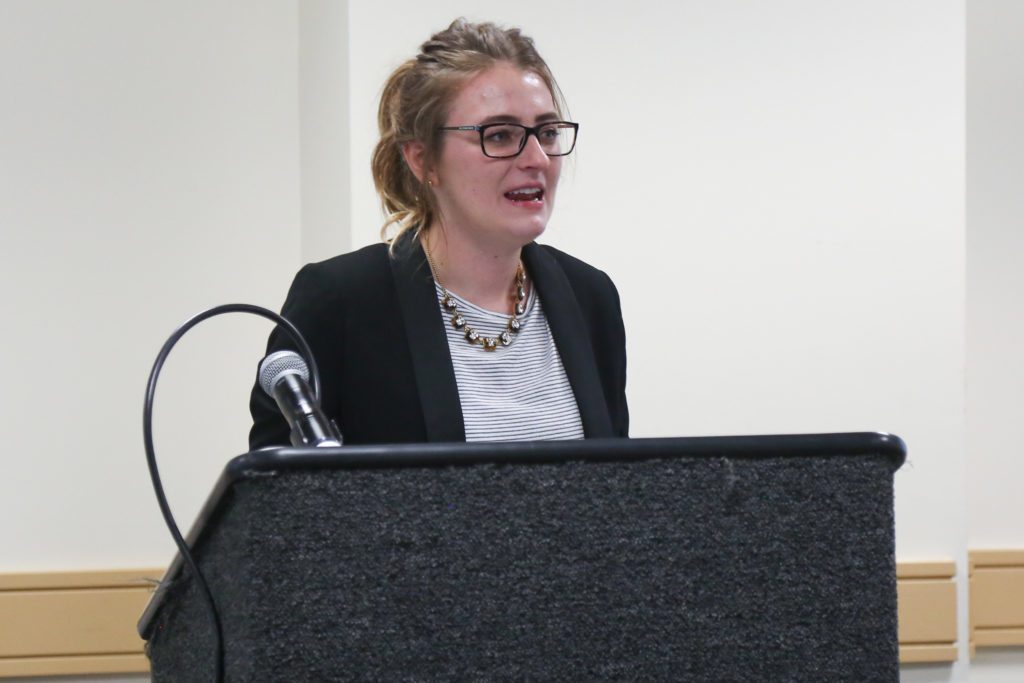Student leaders are taking the first steps to try to address the harassment scandal that engulfed Student Association elections last spring.
A six-member committee will review the Joint Election Committee’s charter beginning this month to examine rules governing how candidate violation hearings are conducted, which committee documents can be made public and when elections are scheduled. Leaders of the effort said it will address criticisms lobbed against the JEC after last year’s SA presidential election descended into allegations of stalking and harassment and critics said the JEC was not prepared to manage the fallout.
The committee will consist of six voting members from the SA Senate as well as non-voting members from Program Board and Class Council – groups whose elections are also run by the JEC. The group will submit recommendations to the SA Senate by Nov. 20.
After former SA presidential candidate Cole Ettingoff accused an opponent, Lande Watson, and her supporters of harassment and stalking, the JEC postponed the presidential election and disqualified Watson from the race after a tense 10-hour-long hearing to determine the validity of the charges.
SA Executive Vice President Sydney Nelson said this academic year the SA decided to begin filling JEC positions in September, rather than December, to give committee members extra time to organize the election and meet with advisers in the Center for Student Engagement.
“We really want students to feel that this process is inclusive and that we’re all taking steps to rectify the culture, the climate and the process of how the elections have occurred in the past couple of years,” she said.
“People forget that we’re just students. We aren’t out to get everybody.”
Nelson said the committee will also examine which of the JEC’s documents are allowed to be made public as part of the review.
Students involved in last year’s allegations were outraged that the JEC initially posted violation complaints unredacted on its website, publicly identifying the students levying harassment accusations and those accused, including one student who was misidentified. The complaints were later reposted with personal information no longer public.
The committee’s current charter requires all documents – including candidate spending forms and violation complaints – to be made public.
Former JEC secretary Isabella Gianani said the biggest problem during last year’s election was rumors surrounding the candidates and JEC members, which led to a backlash against both students involved and members of the committee.
“What happened last year definitely isolated the part of the GW community that sees elections as very political,” Gianani said. “People forget that we’re just students. We aren’t out to get everybody.”
Reforming the charter could provide clearer guidelines for how to reschedule elections in the event they need to be postponed, she said.
The SA amended the JEC’s bylaws in the spring to allow for more flexibility when setting election dates. At the time, then-JEC Chair Alex Simone asked the senate to consider rewriting the JEC charter in the future because the election surfaced a “couple of holes in the charter that no one’s realized before.”
Aimee Triana, the former vice chair of the JEC, said the committee was left scrambling to address the scandal after the complaints were submitted the weekend before the election. She said that was the biggest issue the body faced, not necessarily holes in the charter.
“If you’re actually about the students, you’re going do the right things for the University whether you’re a president, EVP or not.”
“We are basically an enforcing body, we aren’t a legislative body,” she said. “If the SA makes rules that will improve the situation and help us do a better job then great, but if they don’t then we only can go by the rules that they give us.”
Associate Dean of Students Tim Miller, who advised the SA during elections last year, said the committee should look at last year’s election from the perspective of all parties involved. Anne Graham, the assistant director of student involvement and Greek life, is now the adviser to the SA.
Miller said the JEC charter has changed several times over the years and violation hearings during elections are not uncommon. Although the SA has amended the JEC bylaws and charter several times over the years, the SA last rewrote the charter in 1999.
Miller added that candidates have also been removed from ballots before. As recently as 2009, a presidential candidate was disqualified from a runoff election.
He said the SA should appoint JEC members at the end of April so they can begin work over summer and determine election dates by September, which would allow extra time to recruit students to run and plan for elections.
“It feels like there’s a winning-at-all-costs mindset,” he said. “If you’re actually about the students, you’re going do the right things for the University whether you’re a president, EVP or not.”
Sen. Brady Forrest, G-at-Large, who sponsored the bill creating the committee, said the current JEC charter makes members responsible for things that they “aren’t necessarily qualified to handle.”
He added that the review committee will host three town halls over the next two months to gather student input on the issue.
“It’s really early in the school year, so there’s enough time to have the new election procedure set up so that everyone can be on the same page,” Forrest said. “In the spring people should see a radically improved election process.”
Cayla Harris contributed reporting.





